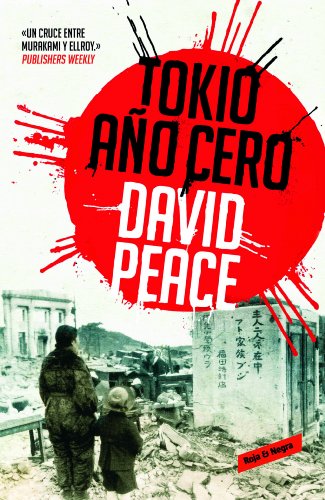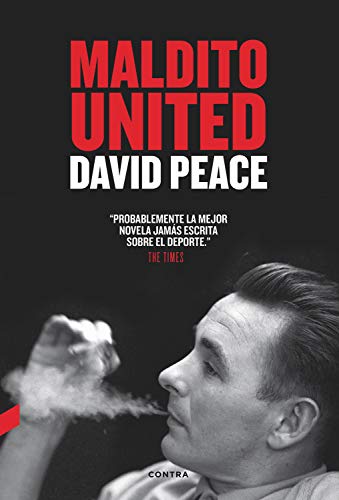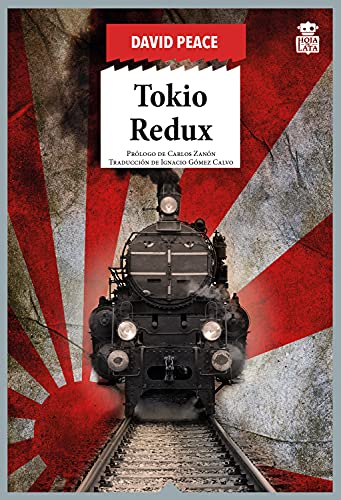Say the writer David peace has a dystopian point in the characterization of its plots and its protagonists is an understatement. Peace is magnetically apocalyptic and morbidly catastrophic. Or at least a large part of his work is.
Perhaps to reconcile his narrative baggage with another less dramatic literary look, Peace also writes some novels that do not have such a dark horizon. But except when fiction football stories (as possessed by a hooligan spirit), it does not seem that the good of Peace is as comfortable as it is discovered in those other rapturous and captivating plots of the world looming to its end.
Of course, when I say that Peace is dystopian, it is not that he is a writer of science fiction. Nor does it need to be done to transform a world subject to the rules of the black genre from the first to the last of its characters and in every situation or scenario. Because the dystopia of each era always ended up arriving, even ours today ... In the same way that Blade Runner has a noir setting in its futuristic scenery, Peace seems to reach that social dystopia in the present time. And it is that literary genres are not exclusive or exclusive. You have to dare to mix so as not to always tell the same story.
David Peace's Top 3 Recommended Novels
Tokyo, year zero
In every war there are two enemies, the one who attacks and the one who tries to survive the misery after the attacks. The once peaceful neighbor is capable of anything to survive. And like the worst of murderers, he will be willing to take down anyone who gets in his way. The human being to the reunion of his atavistic instinct of violence and fight. It is not personal. It's just a matter of hunger and need in principle. Until you get a taste for murder.
Tokyo has been badly damaged by the allied bombings, the population is starving while the victors, despots and brutal, occupy the territory. Amid the heat and chaos, Japanese police inspector Minami walks lamely to a crime scene. A young woman appears strangled in a city park and Minami senses that it is a matter of time before more women turn up dead.
Addicted to painkillers and deep in the networks of the local crime lord, Minami, struggles to find out the origin of these complex and chilling crimes, increasingly convinced that his own past and darkest secrets are tied to the of his murderer.
Damn United
Nobody like Peace to narrate the life, work and legend of such an eccentric and strident guy as Brian Clough. Of the characters without much grace we have their biography. Of the geniuses we have their novels.
In 1974, the brilliant and controversial Brian Clough took over as coach of the Leeds United, that the previous season had won the League led by his previous Mister, Don revie, the eternal rival of Clough. Clough's fleeting and fateful stint at Leeds would last only forty-four days.
The story intersperses these disastrous days with the narration of the hectic career of a young Clough, who, after suffering an early injury that prematurely removed him from the pitch and directing Hartlepool, managed to achieve a Derby County for which no one gave a tough one was Second Division champion in the 1968-1969 season and was crowned First Division champion in 1972, a feat that made Clough and his second coach, Peter Taylor, legends.
With a grim and obsessive prose that reinvents the Joycean "stream of consciousness" and draws on the particular style of Thomas Bernhard, Peace erects the portrait of a man maddened by an inordinate ambition, angry and vindictive, despotic and vindictive, who shocked and fascinated equal parts to the English from the benches, the television sets and the columns of the sports press. Using an exhaustive documentation process, Peace reconstructs in this outstanding work of documented fiction some of the darkest and most intense days in British football.
Tokyo Redux
On July 5, 1949, the Occupation had a hangover. Japan, militarily occupied by the United States, wakes up from the Fourth of July celebrations with worrying news: Sadanori Shimoyama, the president of the National Railway Company, the man who loves trains, has disappeared.
Death threats weigh on him after announcing one hundred thousand dismissals. Shimoyama is a key piece so that everything continues to function under the Occupation, so that the country loves its new masters, so that the third world war does not break out. General Willoughby, right-hand man to Supreme Commander MacArthur, his favorite fascist, tasks Detective Harry Sweeney with focusing all available resources on finding Shimoyama.
And in the fall of 1988, while Emperor Hirohito was dying, Donald Reichenbach, the prestigious American translator living in Japan, received a visit from a young compatriot. He comes to demand information about the distant days when the young Reichenbach worked for American counterintelligence in the land of the rising sun.
Tokio Redux is the story of three men trapped in the madness that surrounds the Shimoyama case, a spectacular classic black novel to which David Peace has dedicated ten years and that completes his Tokyo Trilogy.



